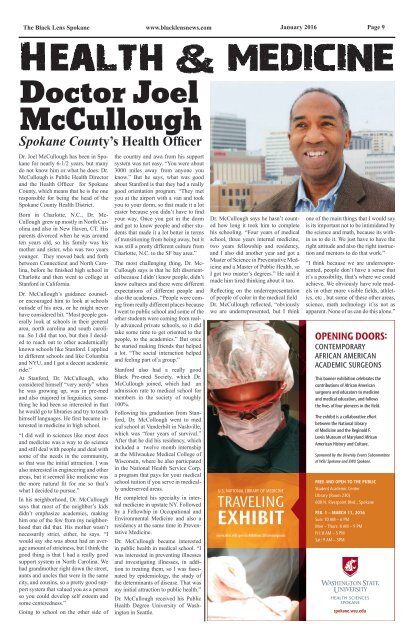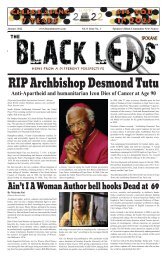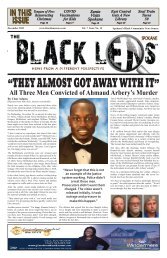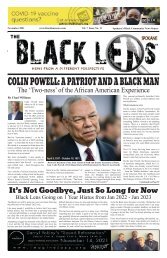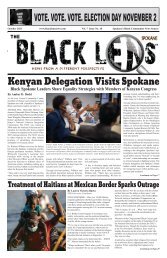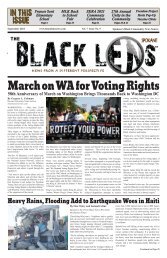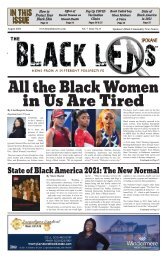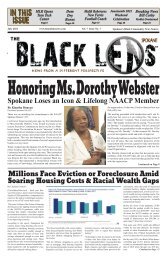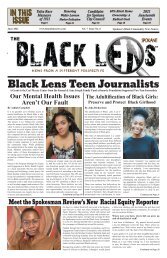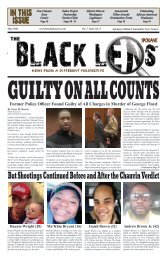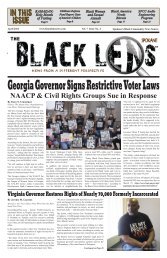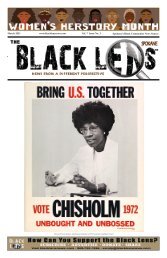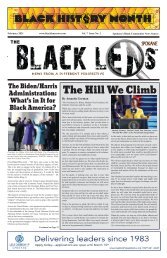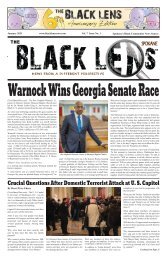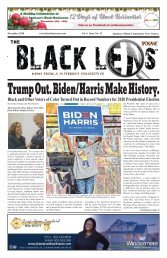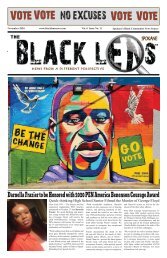Black Lens News - January 2016
The Black Lens is a community newspaper focused on the events, people and issues of importance to the Black community in Spokane WA.
The Black Lens is a community newspaper focused on the events, people and issues of importance to the Black community in Spokane WA.
- TAGS
- spokane
- african-american
- news
- black
You also want an ePaper? Increase the reach of your titles
YUMPU automatically turns print PDFs into web optimized ePapers that Google loves.
The <strong>Black</strong> <strong>Lens</strong> Spokane<br />
www.blacklensnews.com <strong>January</strong> <strong>2016</strong><br />
Page 9<br />
Health & medicine<br />
Doctor Joel<br />
McCullough<br />
Spokane County’s Health Officer<br />
Dr. Joel McCullough has been in Spokane<br />
for nearly 6-1/2 years, but many<br />
do not know him or what he does. Dr.<br />
McCullough is Public Health Director<br />
and the Health Officer for Spokane<br />
County, which means that he is the one<br />
responsible for being the head of the<br />
Spokane County Health District.<br />
Born in Charlotte, N.C., Dr. Mc-<br />
Cullough grew up mostly in North Carolina<br />
and also in New Haven, CT. His<br />
parents divorced when he was around<br />
ten years old, so his family was his<br />
mother and sister, who was two years<br />
younger. They moved back and forth<br />
between Connecticut and North Carolina,<br />
before he finished high school in<br />
Charlotte and then went to college at<br />
Stanford in California.<br />
Dr. McCullough’s guidance counselor<br />
encouraged him to look at schools<br />
outisde of his area, or he might never<br />
have considered hit. “Most people generally<br />
look at schools in their general<br />
area, north carolina and south carolina.<br />
So I did that too, but then I decided<br />
to reach out to other academically<br />
known schools like Stanford. I applied<br />
to different schools and like Columbia<br />
and NYU, and I got a decent academic<br />
ride.”<br />
At Stanford, Dr. McCullough, who<br />
considered himself “very nerdy” when<br />
he was growing up, was in pre-med<br />
and also majored in linguistics, something<br />
he had been so interested in that<br />
he would go to libraries and try to teach<br />
himself languages. He first became interested<br />
in medicine in high school.<br />
“I did well in sciences like most docs<br />
and medicine was a way to do science<br />
and still deal with people and deal with<br />
some of the needs in the community,<br />
so that was the initial attraction. I was<br />
also interested in engineering and other<br />
areas, but it seemed like medicine was<br />
the more natural fit for me so that’s<br />
what I decided to pursue.”<br />
In his neighborhood, Dr. McCullough<br />
says that most of the neighbor’s kids<br />
didn’t emphasize academics, making<br />
him one of the few from my neighborhood<br />
that did that. His mother wasn’t<br />
necessarily strict, either, he says. “I<br />
would say she was about had an average<br />
amount of strictness, but I think the<br />
good thing is that I had a really good<br />
support system in North Carolina. We<br />
had grandmother right down the street,<br />
aunts and uncles that were in the same<br />
city, and cousins, so a pretty good support<br />
system that valued you as a person<br />
so you could develop self esteem and<br />
some centeredness.”<br />
Going to school on the other side of<br />
the country and awa from his support<br />
system was not easy. “You were about<br />
3000 miles away from anyone you<br />
know.” But he says, what was good<br />
about Stanford is that they had a really<br />
good orientation program. “They met<br />
you at the airport with a van and took<br />
you to your dorm, so that made it a lot<br />
easier because you didn’t have to find<br />
your way. Once you got in the dorm<br />
and got to know people and other students<br />
that made it a lot better in terms<br />
of transitioning from being away, but it<br />
was still a pretty different culture from<br />
Charlotte, N.C. to the SF bay area.”<br />
The most challenging thing, Dr. Mc-<br />
Cullough says is that he felt disoriented<br />
because I didn’t know people, didn’t<br />
know cultures and there were different<br />
expectations of different people and<br />
also the academics. “People were coming<br />
from really different places because<br />
I went to public school and some of the<br />
other students were coming from really<br />
advanced private schools, so it did<br />
take some time to get oriented to the<br />
people, to the academics.” But once<br />
he started making friends that helped<br />
a lot. “The social interaction helped<br />
and feeling part of a group.”<br />
Stanford also had a really good<br />
<strong>Black</strong> Pre-med Society, which Dr.<br />
McCullough joined, which had an<br />
admission rate to medical school for<br />
members in the society of roughly<br />
100%.<br />
Following his graduation from Stanford,<br />
Dr. McCollough went to med<br />
ical school at Vanderbilt in Nashville,<br />
which was “four years of survival.”<br />
After that he did his residency, which<br />
included a twelve month internship<br />
at the Milwaukee Medical College of<br />
Wisconsin, where he also particpated<br />
in the National Health Service Corp,<br />
a program that pays for your medical<br />
school tuition if you serve in medically<br />
underserved areas.<br />
He completed his specialty in internal<br />
medicine in upstate NY. Followed<br />
by a Fellowhip in Occupational and<br />
Environmental Medicine and also a<br />
residency at the same time in Preventative<br />
Medicine.<br />
Dr. McCullough became interested<br />
in public health in medical school. “I<br />
was interested in preventing illnesses<br />
and investigating illnesses, in addition<br />
to treating them, so I was fascinated<br />
by epidemiology, the study of<br />
the determinants of disease. That was<br />
my initial attraction to public health.”<br />
Dr. McCullough received his Public<br />
Health Degree University of Washington<br />
in Seattle.<br />
Dr. McCullough says he hasn’t counted<br />
how long it took him to complete<br />
his schooling. “Four years of medical<br />
school, three years internal medicine,<br />
two years fellowship and residency,<br />
and I also did another year and got a<br />
Master of Science in Preventative Medicine<br />
and a Master of Public Health, so<br />
I got two master’s degrees.” He said it<br />
made him tired thinking about it too.<br />
Reflecting on the underrepresentation<br />
of people of color in the medical field<br />
Dr. McCullough reflected, “obviously<br />
we are underrepresented, but I think<br />
U.S. NATIONAL LIBRARY OF MEDICINE<br />
TRAVELING<br />
EXHIBIT<br />
www.nlm.nih.gov/exhibition/aframsurgeons<br />
one of the main things that I would say<br />
is its important not to be intimidated by<br />
the science and math, because its within<br />
us to do it. We just have to have the<br />
right attitude and also the right instruction<br />
and mentors to do that work.”<br />
“I think because we are underrespresented,<br />
people don’t have a sense that<br />
it’s a possibility, that’s where we could<br />
achieve. We obviously have role models<br />
in other more visible fields, athletics,<br />
etc , but some of these other areas,<br />
science, math technology it’ss not as<br />
apparent. None of us can do this alone.”<br />
OPENING DOORS:<br />
CONTEMPORARY<br />
AFRICAN AMERICAN<br />
ACADEMIC SURGEONS<br />
This banner exhibition celebrates the<br />
contributions of African American<br />
surgeons and educators to medicine<br />
and medical education, and follows<br />
the lives of four pioneers in the field.<br />
The exhibit is a collaborative effort<br />
between the National Library<br />
of Medicine and the Reginald F.<br />
Lewis Museum of Maryland African<br />
American History and Culture.<br />
Sponsored by the Diversity Events Subcommittee<br />
of WSU Spokane and EWU Spokane.<br />
FREE AND OPEN TO THE PUBLIC<br />
Student Academic Center<br />
Library (Room 230)<br />
600 N. Riverpoint Blvd., Spokane<br />
FEB. 1 – MARCH 11, <strong>2016</strong><br />
Sun: 10 AM – 6 PM<br />
Mon – Thurs: 8 AM – 9 PM<br />
Fri: 8 AM – 5 PM<br />
Sat: 9 AM – 5PM<br />
spokane.wsu.edu


